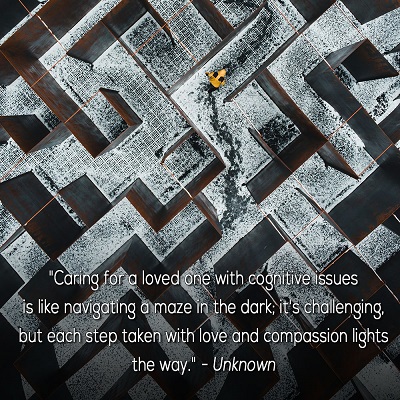 It’s sad when someone we love begins to show signs of cognitive decline. Yes, it can be challenging emotionally and hard to accept, however, it can also be a rewarding and heartwarming experience, so understand that caregiving doesn’t have to be all doom and gloom. There are ways you can give the best care you can, while not losing your own peace of mind.
It’s sad when someone we love begins to show signs of cognitive decline. Yes, it can be challenging emotionally and hard to accept, however, it can also be a rewarding and heartwarming experience, so understand that caregiving doesn’t have to be all doom and gloom. There are ways you can give the best care you can, while not losing your own peace of mind.
As a caregiver, you need to arm yourself with information and knowledge about your loved one’s current cognitive condition. What has caused the problem? You must learn the cause first, because, for example, it may only be a temporary problem due to medications being taken. So being educated about the reason can help in determining what you need and can do.
Then you can work out their immediate needs, such as if they need you to monitor and control their hygiene and personal care, their overall health care, watch their emotional health, and of course their safety.
Be Patient and Understanding and Communicate Clearly
Cognitive issues, such as dementia and Alzheimer’s can change a person’s behavior, attitude, mood, and also their personality. Maybe they were once happy and always playing a joke, whereas now, they are often angry and irritable. It can be frustrating, but patience is key. Be patient at all times!
You have to remind yourself that it’s not the person but the disease that’s causing the negative changes. It’s not their fault that they have trouble remembering things, or that they can’t think clearly. Listen to them and try to understand what they feel and need. Don’t get impatient in front of them.
You may also have to change the way you talk to them. You may need to use easy words and short sentences. Being simple and direct can help them better understand what you’re trying to say. You may also have to show or demonstrate what you mean rather than simply explain with words.
You may also have to answer the same question several times. Again, be patient and understanding.
Create a Safe Space
Their safety is paramount, so you have to ensure that safety protocols are in place, for them and for you. Make their home ‘child-proof’ and less risky for accidents by moving things that could trip them over or hurt them in other ways. Organize the things that are used regularly by them, in spaces they can easily reach. It can also reduce their stress and not make them feel so overwhelmed if all the clutter is removed. Clutter can be daunting.
Lock up medicines and items that can hurt. Label drawers, cabinets, and containers so that your loved ones can easily know what’s inside and find what they’re looking for. However, if they have problems remembering if they took their medications, don’t leave them in reach. They may easily overdose if you don’t monitor them.
Help them Maximize Their Independence
People with cognitive impairment are not totally helpless, and they want to be independent as much as they can. You can help them maximize their independence by adapting certain tasks and activities to their needs, organizing their home and creating a calm environment.
You can also create a routine for them and help them stick to a schedule. This will help give them a sense of normalcy and help them feel more in control of what they can still do on their own.
Final Thoughts
In caring for your loved one, you must not forget to take care of yourself. You don’t want to put everything you have into them and burn out because you haven’t cared for yourself.
That won’t help them or you because if you don’t take care of yourself, your own mental well-being will decline, making you irritable, impatient, and fatigued, and they don’t need that. It may not be easy at first, but once you see where they need you the most, you can create your own plan to make both your lives better.
Finding a support group or staying connected with your friends is also important, so you can share your thoughts or get help where needed. Always remember that you’re doing the best you can, and seeking support when you need it, is a sign of strength, not a sign of weakness. You are a strong person for making the decision to be in charge of their love and care.






